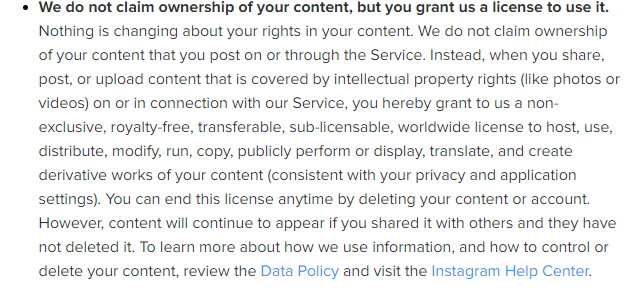Thoughts on Sinclair v. Ziff Davis, which held that Mashable had a third-party license from Instagram to embed plaintiff& #39;s photograph on its website. #copyright
Read carefully.
Read carefully.
The distinction between embedding a photograph or copying and pasting it comes into play, but for different reasons than Goldman v. Breitbart.
Goldman v. Breitbart isn& #39;t the decision to compare this to. Another one is.
Goldman v. Breitbart isn& #39;t the decision to compare this to. Another one is.
The issue in Sinclair is whether, by uploading her photo to Instagram and agreeing to its terms of use, she granted a license to Instagram to sublicense it, and Instagram granted a sublicense for Mashable to embed a photograph.
The photographer agreed to Instagram& #39;s term of use, which allows Instagram to license the work, but you have to look at different places on its site to see how the court gets from point A to point C.
Here& #39;s the Instagram terms of use where the user agrees that Instagram has a license and can sublicense your copyrighted photographs.
And then, elsewhere in the terms of use, it says that "your use of our API is subject to our Platform Policy", which is another link.
The Platform Policy says "we provide the Instagram Platform to help broadcasters and publishers discover content, get digital rights to media, and share media using web embeds."
So based on all of those paragraphs, in there different places in two separate agreements (one incorporated by reference to the one you "agree" to), the court says if your photos are public on Instagram, third parties have the right to embed them. https://www.courtlistener.com/recap/gov.uscourts.nysd.487498/gov.uscourts.nysd.487498.31.0.pdf">https://www.courtlistener.com/recap/gov...
So the embed distinction matters because the court doesn& #39;t hold that a third party can take someone else& #39;s photo, then copy it and use on their own website.
That probably isn& #39;t within the scope of the sublicense, but the court didn& #39;t need to discuss it.
That probably isn& #39;t within the scope of the sublicense, but the court didn& #39;t need to discuss it.
The court also doesn& #39;t hold that embedding a photograph isn& #39;t copyright infringement. It holds that users grant a license to do it.
It might be, if not for the license, copyright infringement.
It might be, if not for the license, copyright infringement.
That& #39;s why this isn& #39;t comparable to Goldman v. Breitbart.
That case held that embedding a photograph can violate the copyright holder& #39;s display right.
License wasn& #39;t an issue.
https://www.eff.org/files/2018/02/15/goldman_v_breitbart_-_opinion.pdf">https://www.eff.org/files/201...
That case held that embedding a photograph can violate the copyright holder& #39;s display right.
License wasn& #39;t an issue.
https://www.eff.org/files/2018/02/15/goldman_v_breitbart_-_opinion.pdf">https://www.eff.org/files/201...
Sinclair v. Ziff Davis doesn& #39;t contradict Goldman v. Breitbart.
Under this week& #39;s decision, you can still argue that the embed is copyright infringement, absent a license.
Under this week& #39;s decision, you can still argue that the embed is copyright infringement, absent a license.
So what& #39;s the decision to compare this one to?
AFP v. Morel v. Getty.
AFP v. Morel v. Getty.
In AFP v. Morel, the photographers sued over unauthorized use of a photograph.
Defendants argued they had a third-party license to use the photo because it was posted on Twitter. https://www.scribd.com/document/120501947/AFP-v-Morel-10-Civ-02730-AJN-S-D-N-Y-Jan-14-2013">https://www.scribd.com/document/...
Defendants argued they had a third-party license to use the photo because it was posted on Twitter. https://www.scribd.com/document/120501947/AFP-v-Morel-10-Civ-02730-AJN-S-D-N-Y-Jan-14-2013">https://www.scribd.com/document/...
The court rejected the third-party license argument. Defendants didn& #39;t adhere to Twitter& #39;s guidelines. They didn& #39;t include the username and it didn& #39;t make the photo look like the Tweet. They didn& #39;t embed the tweet. They just took the photo.
I& #39;m not sure how AFP v. Morel v. Getty would have played out if the defendants embedded the tweet.
But this is the decision to compare Sinclair v. Ziff Davis.
But this is the decision to compare Sinclair v. Ziff Davis.
tldr: this decision isn& #39;t about whether embedding a photograph from Instagram is copyright infringement. It still might be, even under this decision.
This decision is about the scope of the Instagram license.
This decision is about the scope of the Instagram license.

 Read on Twitter
Read on Twitter




